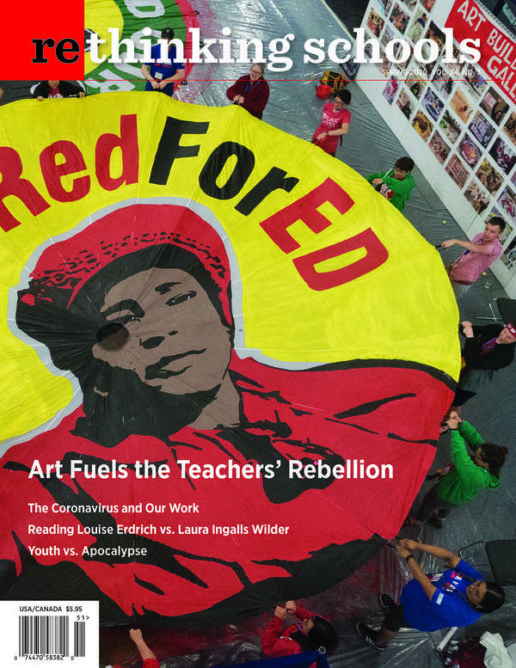The Coronavirus and Our Work
Illustrator: Ricardo Levins Morales

First, we hope that you are safe and healthy. This is a stressful and frightening time for everyone, and the uncertainty of where the coronavirus pandemic is headed adds to our anxiety. Our schools are closing. Our conferences have been canceled. Our communities are under emergency alert. We are told to practice “social distancing” to prevent the spread of the virus. And that is right — from a public health standpoint.
But we cannot allow “social distancing” to be a metaphor for how we respond to this crisis and the profound social failure it reflects. This crisis threatens to amplify inequality in countless ways, and more than ever, we need to respond from a place of community, compassion, and solidarity.
We go to press with this issue in early April and we have no idea what’s in store, or how things will have changed by the time you read this. But we know certain things about the history of crises. As Naomi Klein documented in her seminal work, The Shock Doctrine, elite groups always use crises to push “solutions” that enhance their power and profit — to pursue the “policy trinity,” as Klein puts it: “the elimination of the public sphere, total liberation for corporations, and skeletal social spending . . .” The same is already happening during this crisis, with Trump pushing tax cuts and bailouts that disproportionately benefit those who need no help, and angling to bail out his friends in the oil and gas industry as prices plummet.
On March 12, the Federal Reserve System poured an emergency infusion of $1.5 trillion into credit and financial markets. No one asked, “How will you pay for it?” The amount was nearly equal to the total student loan burden that has saddled generations with staggering debt while successive administrations pursued austerity for the many and “socialism” for the rich.
*** Subscribe to Rethinking Schools by clicking here ***
And meanwhile, private prison corporations continue to profit from the mass incarceration of immigrants and poor people in detention camps and prisons, where this virus will likely spread quickly, with devastating consequences.
Amidst the all-too-familiar press for a corporate agenda, we can also see the outlines of a more progressive response. Activists and social movements are demanding immediate steps toward free universal health care, paid sick days and paid family and medical leave, direct subsidies to those facing loss of jobs and income, an end to evictions, a moratorium on foreclosures and utility cutoffs, and emergency housing for all who need it. We need a systemwide social justice “shock.”
As K–12 schooling moves out of buildings and onto the internet, we know that profiteers and hucksters will promote a commodified vision of teaching and learning. Who needs real teachers when students can simply be planted in front of computers? And we have already seen outfits like the Koch brothers-funded Bill of Rights Institute, stepping up advocacy of its laissez-faire capitalist ideology, embedded in online U.S. history and government lessons about “freedom and opportunity that exist in a free society.” The right wing loves crisis. As the free market guru Milton Friedman wrote in the Wall Street Journal following Hurricane Katrina in 2005, “This is a tragedy. It is also an opportunity to radically reform the educational system.”
Now is not the time to pull away from social justice education activism, but to find new ways to express it. As schools go on to the internet (at least for older students) — or into hibernation — we need to make sure this happens in a way that does not promote greater inequality. For many of our students, schools are not only sites of learning, but also sources of nutrition and health care. We need to organize to protect and expand these services. As with other forms of wealth in our society, computer technology and internet access are not distributed equally. We need to ensure that whatever alternative means of teaching and learning school districts institute have equity at the center — including freezing standardized testing, which only magnifies inequality. And as Trump denounces the “foreign virus” that has invaded our country, we have to organize against this naked xenophobia, and to defend especially the rights of children in immigrant detention centers, who are some of its most vulnerable victims.
For almost 35 years, Rethinking Schools has argued for the defense, and for the transformation, of public schools. Because quality education — education that is participatory, joyful, hopeful, critical, anti-racist, alert to cultural and linguistic diversity, academically rigorous, and that equips students to build a better world — is a human right. But so is health care. So is housing. So is clean water and affordable energy. So is meaningful work. So is transportation. And so is a stable climate. These are all components of the more democratic and egalitarian society that we want for our students and for ourselves.
The coronavirus crisis is horrific, and even in its early days has led to great suffering, and widespread terror. But this crisis is not a time of retreat; it is a time to insist on, to organize for, an agenda of human rights and wealth redistribution. Has there ever been a time when the need for universal free health care was more essential — and more obvious? Or paid sick leave? Or for everyone to have guaranteed access to clean water and a safe place to live?
So yes, please wash your hands, and then raise them, to continue to fight for equality and justice.
Subscribe to Rethinking Schools by clicking here.

